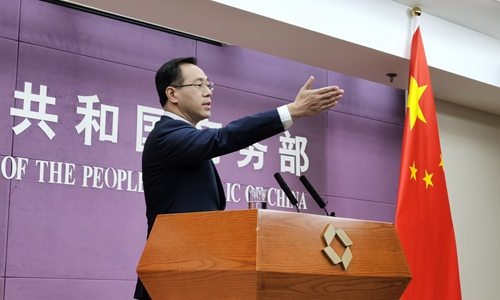
Gao Feng, a spokesperson for the Chinese Ministry of Commerce, calls on reporters to ask questions at a press briefing in Beijing on Thursday. Photo: Wang Cong/GT
China on Thursday excoriated certain provisions in a recently adopted US defense bill that puts restrictions on Chinese products and companies, vowing to take "necessary" countermeasures if the US hurts Chinese interests.
The scathing criticism from the Chinese Ministry of Commerce (MOFCOM) of the US National Defense Authorization Act (NDAA) for 2020 underscored lingering tensions between Beijing and Washington, despite a looming phase one trade agreement that many view as a step to de-escalate the trade war.
"China deplores unfavorable provisions in the NDAA targeting Chinese companies," Gao Feng, a spokesperson for the MOFCOM, told a press briefing in Beijing, noting that restrictions on certain Chinese products and sanctions on Chinese companies are "vile examples" of the US using state power to undermine normal business activities.
Gao urged the US to abandon political bias and zero-sum thinking and stop the wrongful actions. "China will closely monitor how the implementation of the act will affect Chinese companies and will take all necessary measures to protect Chinese firms' legitimate rights and interests," he said.
The NDAA, which was signed into law by US President Donald Trump last week, includes provisions that authorize sanctions on Chinese drug companies. It also bars the US government from taking Chinese telecom giant Huawei off its export control list and US companies from buying Huawei's equipment, according to media reports.
The NDAA came after Chinese and US negotiators agreed on the text of the phase one trade agreement following a 19-month trade war that has rocked global markets. Officials are still working on legal and translation reviews of the deal and remain in close contact over details of the signing of the deal, Gao said on Thursday.
US' protectionist actions against Chinese companies also point to a reality that tensions between the world's biggest two economies will not fade, despite the phase one deal, unless Washington shifts its hostile attitude toward China, Chinese experts noted.
"The overall direction of the China-US trade relationship is not so optimistic because some radical elements in the US are actively pushing for action to disrupt what could have been a constructively relationship in the interests of both countries as well as the global economy," Li Yong, a deputy chairman of the expert committee of the China Association of International Trade, told the Global Times.
"If that zero-sum thinking does not change, the tensions will persist," Li said.


